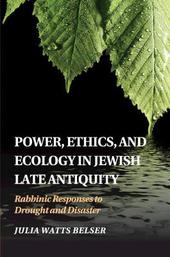
|
Power, Ethics, and Ecology in Jewish Late Antiquity: Rabbinic Responses to Drought and Disaster
Paperback / softback
Main Details
Description
Rabbinic tales of drought, disaster, and charismatic holy men illuminate critical questions about power, ethics, and ecology in Jewish late antiquity. Through a sustained reading of the Babylonian Talmud's tractate on fasts in response to drought, this book shows how Bavli Ta'anit challenges Deuteronomy's claim that virtue can assure abundance and that misfortune is an unambiguous sign of divine rebuke. Employing a new method for analyzing lengthy talmudic narratives, Julia Watts Belser traces complex strands of aggadic dialectic to show how Bavli Ta'anit's redactors articulate a strikingly self-critical theological and ethical discourse. Bavli Ta'anit castigates rabbis for misuse of power, exposing the limits of their perception and critiquing prevailing obsessions with social status. But it also celebrates the possibilities of performative perception - the power of an adroit interpreter to transform events in the world and interpret crisis in a way that draws forth blessing.
Author Biography
Julia Watts Belser is Assistant Professor of Jewish Studies in the Department of Theology at Georgetown University, Washington DC. Her articles have appeared in numerous journals, including the AJS Review, the Journal of the American Academy of Religion, the Journal of Feminist Studies in Religion, Worldviews: Global Religions, Culture, and Ecology, and the Journal of the Society of Christian Ethics.
Reviews'Reading this volume was both easy and enjoyable. At times, Belser's prose is poetic. (A rare statement for an academic tome!) ... Belser's volume offers many fresh insights into an oft-studied tractate. While this book might focus on disaster, as a work of scholarship, it is in fact a success.' Jordan Rosenblum, AJS Review 'This excellent study of Bavli tractate Ta'anit investigates the nexus of meaning that links Jewish conceptions of ecology, theology, and ethics ... The carefully orchestrated sequence of chapters leads from a focus on droughts and rain as signs to the inherent ambiguity of natural signs, the protective power of merit in view of disasters, charisma and ritual fasting, the limits of human charismatic power, and the critique of surface appearances. An introduction that outlines the main themes and a short conclusion entitled 'Power and Perception' in Bavli Ta'anit frame the analytic chapters ... I can highly recommend the book to students and scholars of ancient Judaism, rabbinic literature, ancient Christianity, Graeco-Roman and Persian culture. It constitutes an important contribution not only to studies of the Babylonian Talmud but also to the wider study of holy (wo)men in late antique society.' Catherine Hezsec , Theologische Literaturzeitung
|